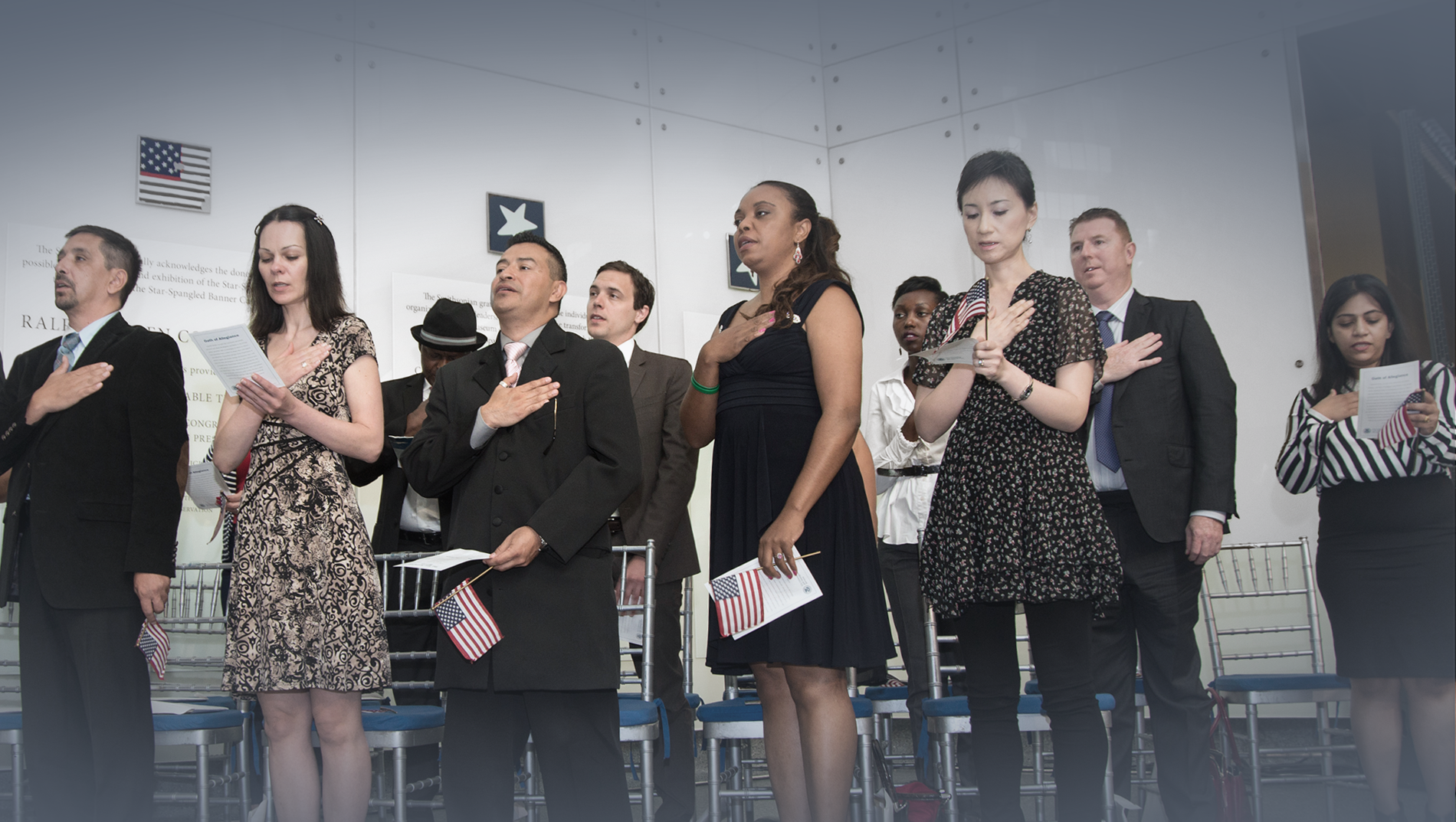Immigration 101
The U.S. immigration system is complex and can be difficult to understand. These resources provide key data points, historical information, and background on hot topics in immigration. Learn the basics about immigration. Immigration in the United States is complex and ever-evolving. Start here to understand the fundamental aspects of immigration policy, its history, and its impact on both individuals and the country at large. Learn commonly used terms about immigration law and how the U.S. immigration system is designed. Explore layered topics like how and whether immigrants can become citizens, as well as what individual protections look like under the law.
How the United States Immigration System Works
- How the Immigration System Works
- June 23, 2024
U.S. immigration law is very complex, and there is much confusion as to how it works. This fact sheet provides basic information…
Read More
Birthright Citizenship in the United States
- Birthright Citizenship
- October 16, 2024
This fact sheet explains birthright citizenship, the Fourteenth Amendment, and its interpretations. Who is…
Read More
Asylum in the United States
- Asylum
- August 27, 2014
Asylum seekers must navigate a difficult and complex process that can involve multiple government…
Read More
Dishonest Data on Immigration Cripples Honest Debate and Sensible Lawmaking
For years, data produced by restrictionist, anti-immigrant advocacy groups have permeated politics and policy. Today is no different. What’s alarming, however, is the ease with which politicians and lawmakers are using this dishonest data to support their restrictive positions on immigration. Read More

On Immigration, Some GOP Candidates Prefer Hostile Rhetoric to Policy Solutions
Over the weekend, Republican presidential hopefuls Herman Cain and Michele Bachmann made it clear that they were willing to increase their anti-immigration rhetoric in order to court voters. In the process, both confused the right to free speech with the responsibility of free speech, turning what should have been a debate on immigration policy into cheap and insensitive anti-immigrant rhetoric. Read More

Dayton, Ohio Passes Plan to Revitalize Economy through Immigrant Integration
Shortly after Alabama began implementing their anti-immigration law (HB 56), Dayton, Ohio passed legislation that welcomes and integrates immigrants with the hope that they will revitalize their slowing economy. Faced with a declining population, Dayton’s City Commission voted unanimously last week to adopt the Welcome Dayton Plan—a plan that is tapping into the very economic stimulus that Alabama is driving out. Read More

Declining Cities Look to Immigrants to Revitalize Economies and Increase University Enrollment
In a recent speech to the U.S. Chamber of Commerce, New York City Mayor Michael Bloomberg highlighted the vital role immigrants play in stimulating economic growth. Bloomberg called for immigration policies that “spur innovation, increase the number of entrepreneurs who start businesses here, and create jobs for Americans on every rung of the economic ladder." With U.S. unemployment still hovering around 9%, some declining U.S. cities are also looking to harness the economic and entrepreneurial power of immigrants. Small towns, particularly in America’s rust belt, are contemplating programs that attract immigrant growth in hopes of revitalizing their towns and universities. Read More

GOP Candidates Distort Truth on In-State Tuition for Unauthorized Students
Texas Governor Rick Perry, a candidate in the Republican presidential primaries, has been taking a lot of conservative heat lately over his support for the “Texas DREAM Act.” That bill, which Perry signed into law in 2001, allows young unauthorized Texans who came to this country as children to qualify for in-state tuition in state colleges and universities in the same way as their lawfully present peers. Perry says that supporting the bill was an act of mercy towards unauthorized youth who had no say in the decision of their parents to come to the United States without permission. He also says that it is in the best interest of the state to educate unauthorized children rather than consigning them to the margins of society. Read More

Bridging the Ethnic Generation Gap: Why an Aging Population Will Depend on a New Generation of Workers
There is a generation gap in the United States and it is not only a difference in age. It is a difference in color as well. The predominantly white Baby Boomers are just this year beginning to reach retirement age. As they leave the labor force and the tax base over the next two decades, a new generation of Latinos and Asians will take their place in the U.S. economy as workers and taxpayers. It is the tax dollars of these immigrants and children of immigrants which will sustain the Social Security and Medicare programs upon which the Baby Boomers will rely. And it is these immigrants and children of immigrants who will become the doctors, nurses, health aides, and countless other workers upon whom so many aging Baby Boomers will depend. Read More

How Will DHS’s Prosecutorial Discretion Guidelines Impact Gay and Lesbian Bi-National Couples?
Yesterday, the Department of Homeland Security (DHS) announced that they would take concrete steps to implement existing guidance on prosecutorial discretion in an attempt to provide relief for low priority immigration cases. DHS also announced that a new committee will review 300,000 immigration cases currently in removal proceedings to determine which cases are low priority and can be administratively closed. Some of the factors used in determining low priority cases are family relationships and community ties—factors the Administration said yesterday may apply to gay and lesbian families. Read More

Mexican Migration Patterns Signal a New Immigration Reality
Fewer Mexicans are Entering the U.S., Fewer Are Leaving, and Mexican American Births Now Outpace Immigration from Mexico Much of what we thought we knew about immigration is changing, and the new reality means we need to think differently about how we approach immigrants and immigration reform in the United States. Unauthorized immigration has clearly paused, and three-fifths of unauthorized immigrants have been in the United States for more than a decade. Immigrants are becoming more integrated into U.S. communities. Given these trends, now is the time to seriously consider comprehensive immigration reform. Read More

Restrictionist Group Strikes Out in Latest Report on Children of Diplomats
BY MARGARET D. STOCK, COUNSEL TO THE FIRM, LANE POWELL PC The Center for Immigration Studies (CIS) has been known for coming out with some odd reports over the years—but their latest is notable for its factual and legal flaws—and for argument that we should expand several different government bureaucracies to chase down the dozen or so children born in the U.S. each year to diplomats with immunity. The CIS report, “Birthright Citizenship for the Children of Diplomats?,” is about the one group of people that everyone agrees is exempted from birthright citizenship—the children born to foreign diplomats. It claims that, even though these people are not U.S. citizens, they are de facto citizens because they are able to receive Social Security numbers. If you look at the facts, their argument doesn't hold water. Read More

Arizona’s Latest Border Fence Initiative Yet Another Obstacle to Fighting Crime
BY TERRY GODDARD, FORMER ATTORNEY GENERAL OF ARIZONA Over the years, Arizona has seen an exceptional number of frauds, consumer scams and rip offs. Maybe the heat stimulates the flimflam artists, but the sad fact is they come here and discover new and creative ways to take other peoples' money. As Arizona’s Attorney General for the past eight years, I was dedicated to exposing and prosecuting scams, large and small. Unfortunately, the latest ploy is perpetrated by one of Arizona’s own politicians, state senator Steve Smith, who has developed a new scheme for taking money from well-meaning Americans—building the border fence. Read More
Make a contribution
Make a direct impact on the lives of immigrants.

